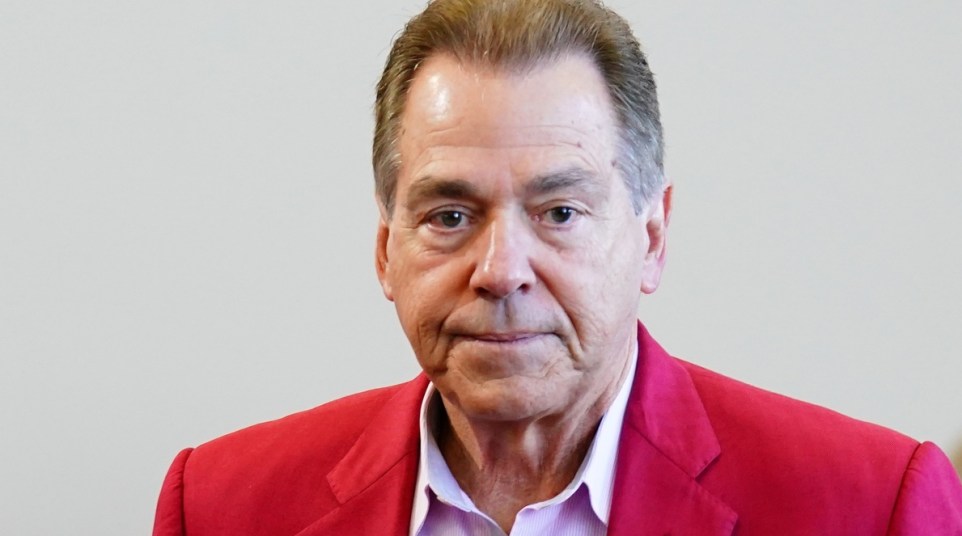
O'Gara: Why Nick Saban's Capitol Hill appearance wasn't as hypocritical as many thought
You know the drill. Old man yells at cloud, internet dunks on old man, rinse, repeat.
When 72-year-old Nick Saban spoke at a college athletics panel to discuss NIL on Capitol Hill, you knew what to expect. A ridiculously wealthy former coach explained why there are issues with a system that, as he said, is “pay for play” with the richest teams set to have the biggest advantage. The internet collectively rolled its eyes at Saban for admittedly not being on board with the new way of the college athletics world.
“All the things I believed in for all these years, 50 years of coaching, no longer exist in college athletics,” Saban said on Tuesday (H/T CBS Sports). “It’s always been about developing players, about helping people become more successful in life.”
Yep. It’s easy to dunk on Saban for getting in front of a divided Congress and talking about how “it isn’t what it once was” while pointing out that it’s a bit hypocritical to say that about athletes getting paid in a sport that made him generationally wealthy. He made more than $100 million alone as Alabama’s coach, after all.
But the biggest misconception about Saban’s gripe is how he feels about student-athlete compensation. He’s for it. Like, he’s so for it that in that same appearance before a divided Congress, Saban also advocated for … revenue sharing?!?
“If we had some sort of revenue sharing proposition that did not make student-athletes employees … I think that may be the long-term solution,” Saban said. “You could create a better quality of life for student-athletes, you could still emphasize development, you can still create brand and athletic development with a system like that and it would be equal in all institutions. You couldn’t raise more money at one school to create a competitive advantage at another.”
Is that a bit idealistic? Perhaps. Revenue sharing and making student-athletes employees seem to go hand in hand in these conversations. One would think if there was a way to make that happen, it would’ve already been signed off on by legislators, university presidents and athletic directors. Shoot, maybe even the NCAA would offer up a vote of confidence.
It might not sound like it with the more “it isn’t what it once was” parts of his stance, but Saban is attempting to get to a compromise here. He’s not pretending that we can/should get back to a pre-NIL world. To advocate for revenue sharing for student-athletes is to acknowledge that times have changed. Or rather, the money has changed. This is a different world than it was in 2007 when Saban became the first $4 million coach in the history of the sport. It’s the sport that fueled annual $100 million TV checks coming in for Big Ten and SEC schools by the end of the decade.
Saban is a 72-year-old man who stepped away from coaching — admittedly in part because of those changes — and could be doing literally anything besides sitting in front of a divided Congress and speaking about a profession that’s no longer on his taxes. He might lack some self-awareness when it comes to the “competitive imbalance in recruiting” part of the argument, but let’s instead focus on what he’s advocating for.
Revenue sharing is more sustainable than booster-constructed rosters. That’s Saban’s point. If student-athletes can still rightfully earn a piece of the pie, but we’re just pivoting the main source of that revenue stream back to the media contract, doesn’t that benefit the most parties involved? We’d still have NIL deals, but revenue sharing, in theory, would take away the transactional nature of recruiting both at the high school level and in the portal.
If the NIL floodgates were opened because media contracts ballooned, doesn’t it make sense to make that the new primary source of student-athlete compensation?
Current legislation doesn’t allow for that. Hence, why Saban and Alabama AD Greg Byrne were on Capitol Hill in the first place. That’s on the heels of Congress ruling against the NCAA and in favor of Tennessee in regards to the organization enforcing interim NIL policies. That ruling was a win for those who dislike the NCAA and for those who are in favor of student-athlete empowerment. But it also opened the floodgates even more knowing that a federal ruling stated that the NCAA cannot investigate anything involving NIL, whatever that’s interpreted to be.
Saban won’t gain public sympathy advocating for change as the voice of the coaches. That’s essentially what he’s doing. Public sentiment isn’t going to sympathize with the 8-figure coach who’s being tasked with a new set of challenges, especially when for so long, the structure dictated that a booster buying a kid a cheeseburger was illegal.
But the public shouldn’t also dismiss Saban’s desire to improve a system that’s at a crossroads. Saban maintained on Capitol Hill that he’s pro-NIL.
“As I said before, Name, Image and Likeness is a great opportunity for them to create a brand for themself. I’m not against that at all,” Saban said. “But to come up with some kind of a system that can still help the development of young people, I think is paramount to the future of college athletics.”
I don’t know that Saban’s push for revenue sharing without making student-athletes employees is ever going to happen. I do know that a structure-less model isn’t the future, even if it is gratifying to see the pendulum swing drastically in the other way.
Saban might not have the solution, but he’s not a hypocrite to address the problem.
LIVE: Sports betting in North Carolina is now legal! Here’s how you can sign up with one of Saturday Down South’s top-ranked North Carolina sportsbooks so you don’t miss out on the action during March Madness!
